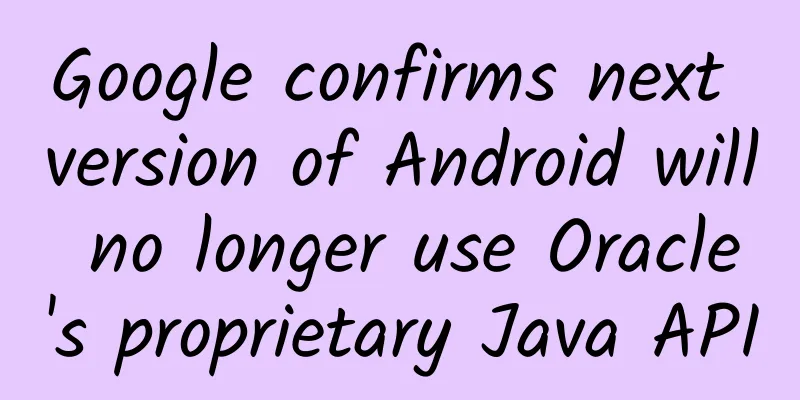Google confirms next version of Android will no longer use Oracle's proprietary Java API

|
Google is planning to switch Java application programming interfaces (APIs) from Oracle's proprietary Java Development Kit (JDK) to the open source OpenJDK. Hacker News first exposed the "mysterious Android code base" last month, and Google also confirmed to VentureBeat that "Android N" will only rely on OpenJDK, rather than Android's own version of the Java API.
A Google spokesperson told VentureBeat:
Android provides some Java API libraries to support application development in the Java programming language, which are mainly divided into two parts - APIs for the library, and deployment code developed by Google that enables the library to work. As for Java's current owner, Oracle, there are two implementations of these libraries - the proprietary JDK version, and the open source OpenJDK version. Google decided to "consolidate" its efforts on OpenJDK, which Android already uses in some places, which means the company will share its implementation code. Initial import of OpenJdk files. Create new libcore/ojluni directory with src/main/java and src/main/native subdirectories. Build ojluni into core-oj jar. Use openjdk classes from java.awt.font package. Copy all files from jdk/src/share/classes and jdk/src/solaris/classes directories in openjdk into libcore/ojluni/src/main/java. Copy following native files from openjdk to libcore/ojluni/src/main/native: [long list of files] The "code commit" mentioned above indicates that 8902 files have been changed, which clearly indicates that the OpenJDK code has been added to Android. Google hopes that developers will be happy with this change because it simplifies the code they use to build applications (common code for these Java API libraries instead of multiple code bases). |
<<: The Programming Story of Little Printf: Chapter 2
>>: 13 Wearable Technology Trends to Watch in 2016
Recommend
Fission marketing planning: How to increase the fission factor of products?
However, stimulating users to share can no longer...
One reason is enough to persuade you to eat more figs!
Now is the season for figs. Looking at the plump ...
Paid promotion-detailed explanation of advertising!
Before writing the whole article, I organized a g...
Live | Analysys CTO Guo Wei: Lean Data Analysis - How to make your company have the same analytical capabilities as BAT
[51CTO.com original article] Every enterprise hop...
Chinese scientists have made important discoveries about lunar soil →
Remote sensing exploration has revealed that wate...
The number of fans increased by more than 100,000 in 4 days. I want to talk about the research on user fission growth
After working in growth for more than a year, I s...
What kind of psychological pressure can college students have? I finally understand after reading this!
In conclusion: In the current popular "crazy...
360 Children's Watch 3S Preview: A Positioning Device for Children's Wrists
While you are still considering whether to buy a ...
33 essential professional terms for information flow advertising, you may not have heard of the first one!
Today, we have compiled 33 professional terms tha...
What are the specific contents of the 2022 National Conference on Stabilizing the Economy? Attached the latest full text
In March of this year, many parts of my country w...
The "number one internet celebrity" in the tech trend circle, Aion LX has evolved in technology and its value has been comprehensively improved
On November 3, GAC Aion LX technologically evolve...
Jiaozuo Mini Program Development Company, how much does it cost to develop an attendance mini program?
Jiaozuo attendance applet development price 1. Di...
Mr. San·Oral Copywriting Methodology-Advanced Topic Selection-Hot Copywriting, Improve the 5-second broadcast and quickly write hot copywriting
Mr. San·Oral Copywriting Methodology-Advanced Top...
The essence of marketing promotion is to acquire customers
Whether it is old marketing or new marketing , th...









